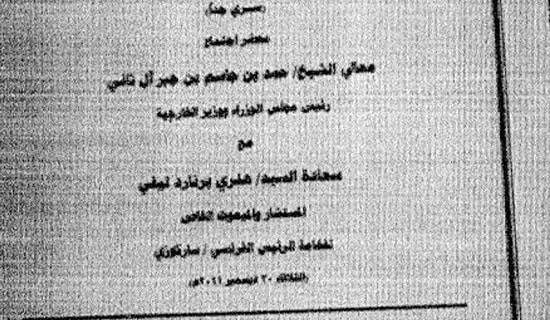In a March 28, 2008 editorial, the Saudi daily Al-Watan wrote that the peace accords between Israel and Egypt prove that an Arab-Israeli peace is possible, and that such a peace agreement must address all aspects of the Palestinian issue so that true normalization can be attained.
The following are excerpts from the editorial: [1]
"A Peace Agreement between the Arabs and Israel Is Possible if There Is a True Desire on All Sides"
"On March 26, 1979, Egyptian President Anwar Al-Sadat signed, together with then-Israeli Prime Minister Menahem Begin, the Camp David accords. They were also signed by U.S. President Jimmy Carter, on behalf of the United States, which had taken the negotiations under its wing.
"Without going into the circumstances of the signing of the accords and the international, regional, and Arab conditions that permitted reaching them, and despite the fierce opposition with which they were met at the time and the measures taken by most of the Arab states against Egypt... - perhaps there are some lessons that the Arabs, Israel, and the international community can learn from these accords in order to arrive at a permanent solution to the problem of the Middle East.
"The first lesson is that arriving at a peace agreement between the Arabs and Israel is possible if there is a true desire [to do so] on all sides.
"President Al-Sadat certainly had such a true desire to arrive at a peace agreement, and so did the Israeli government of those days, each for their own reasons. The existence of this desire was a fundamental factor in the two parties - the the Egyptians and the Israelis - undertaking to enter into exhausting negotiations at Camp David, on the path to concluding the articles of the accords."
SUPPORT OUR WORK

The U.S. Can Play an Active Role in Any Arab-Israeli Negotiations
"The second lesson is the positive and active role that the U.S. can play in any future Arab-Israeli negotiations. It is no secret that President Carter's administration exercised considerable pressure on both Egypt and Israel in order to overcome the difficulties that stood in the way of the negotiations. This pressure was more or less equal on both parties - which made it possible for both parties to accept this pressure and yield to it."
We Must Solve the Palestinian Issue in Order to Achieve True Normalization
"The most important lesson [to be learned from the Camp David Accords] is that any future peace agreement needs to deal with the heart of the Arab-Israeli conflict, the Palestinian issue, in its geographical, political, security, economic, and humanitarian dimensions.
"Any agreement must include the return of all occupied Arab lands to their owners, and must arrive at a just resolution on which all parties agree, so that the articles of the agreements not remain just ink on paper, but will become true normalization that all parties in the region can accept without feeling deceived or wronged.
"Although nearly three decades have passed since the [signing of the] Camp David accords, the Egyptian street is still altogether far from normalization [with Israel]. This is due to the Egyptians' empathy for the suffering of their brothers in Palestine and their rejection of Israel's savage measures and attacks against the Palestinians and other Arab countries."
The Absence of an Israeli Response and Growing Inter-Arab Division Have Made the International Community Hesitant Regarding the Arab Peace Initiative
"These lessons are embodied in the Arab peace proposal, which places the Arab-Israeli conflict in its true context and proposes the appropriate solutions. For this reason, it is the best realistic basis for any move towards peace in the region."
"However, the absence of a favorable response from Israel to the initiative, and the inter-Arab divisions that deepen day by day, have made the international community hesitant to take any measures towards implementing this initiative.
"Thus, the Arab governments should reexamine their calculations, calmly and in isolation from any narrow calculations [of interest], in order to shed light on the Arabs' true enemy and to force Israel to stop its aggression. This aggression has been continuing for 60 years, and it will never stop as long as Israel does not find [itself facing] a united Arab stance that will force it to reexamine its calculations in the region."
Endnote:
[1] Al-Watan (Saudi Arabia), March 28, 2008.




